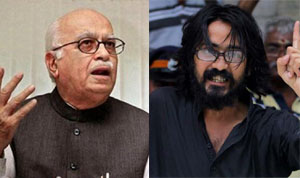
LK Advani compares Aseem Trivediís arrest to Emergency
Mangalore Today News Network/ IBN
New Delhi, Sep 12, 2012 : Senior Bharatiya Janata Party leader LK Advani came out in support of cartoonist Aseem Trivedi, saying the present political situation was worse than Emergency. Advani, in his blog wrote, "India has been independent now for sixty five years. I have always regarded the Emergency period 1975-77 as the worst in so far as suppression of civil liberties and freedom of expression were concerned....But seeing what has happened to political cartoonist and anti-corruption crusader Aseem Trivedi, I have started wondering: Is today’s political set up worse even than the emergency?"
 "Emergency had armed government with extraordinary powers. But the draconian mindset of the present rulers is born out of failure and desperation," Advani added.
"Emergency had armed government with extraordinary powers. But the draconian mindset of the present rulers is born out of failure and desperation," Advani added.
Advani also quoted his diary entry of 1975, where he condemned the ban on cartoon weekly ’Shankar’s Weekly’, where he wrote, "When Hitler assumed power, Germany’s tally of newspapers and periodicals was 4,700. By the time the Nazi nightmare ended, the number had dwindled to less than a thousand. The same might happen here if the trend persists."
Following is the full text of Advani’s blog on Aseem Trivedi’s arrest:
India has been independent now for sixty five years. I have always regarded the Emergency period 1975-77 as the worst in so far as suppression of civil liberties and freedom of expression were concerned.
But seeing what has happened to political cartoonist and anti-corruption crusader Aseem Trivedi, I have started wondering: Is today’s political set up worse even than the emergency? Aseem Trivedi has been arrested, and charged with sedition, an offence punishable with life imprisonment! Trivedi’s sin is that during the Anna movement he published some cartoons which Government regarded as offensive. Trivedi was arrested in Mumbai last week for cartoons he had drawn and displayed in November 2011. The arrest was carried out on the basis of a complaint filed by the legal advisor of a Mumbai-based N.G.O.
Trivedi said: "I have full faith in the Constitution. I will not seek bail unless the sedition charge is withdrawn".
In fact I have before me two cartoons authored during the Emergency period by the legendary cartoonist Abu Abraham, one published shortly after Mrs. Gandhi had had Rashtrapati Fakhruddin Ali Ahmed sign a series of documents relating to the Emergency, and the other one showing a common man carrying a Board on which are affixed Twenty sharp spikes as a caricature of the then Government’s Twenty Point programme.
If the present political regime had been in office in 1975-77, I have no doubt that like Aseem Trivedi, Abu Abraham also would have been behind bars! Emergency had armed government with extraordinary powers. But the draconian mindset of the present rulers is born out of failure and desperation.
I was in Bangalore Central Jail for most of my period of detention. But for two months (July 17, 1975 to Sept. 22, 1975) I was at Rohtak. As a MISA detenu, right from June 26, 1975, when I was first arrested at Bangalore, until January 18, 1977 the day I was released from Bangalore jail, I used to maintain a daily diary of happenings during the Emergency as we came to know about them inside jail.
Under the date Sunday August 31, 1975, what I have recorded at Rohtak, runs as follows:
"Today is a sad day for Indian journalism. The Shankar’s Weekly, the only cartoon weekly in the country, has decided to wind up. If Shankar and his journal are to be fitted into an ideological camp, it will be the same camp to which Indira Gandhi claims to belong. But even he feels so suffocated in the present atmosphere that he has chosen to fold up his journal. The last issue, dated August 31, carries an editorial captioned ’Farewell’. Even the word Emergency does not find a place in the editorial. But there can scarcely be a more devastating indictment of the Emergency than this piece. Shankar writes, inter-alia:
In our first editorial we made the point that our function was to make our readers laugh – at the world, at pompous leaders, at humbug, at foibles, at ourselves. But, what are the people who have developed a sense of humour. It is a people with certain civilized norms of behaviour, where there is tolerance and a dash of compassion.
Dictatorships cannot afford laughter because people may laugh at the dictator, and that would not do. In all the years of Hitler, there never was a good comedy, not a good cartoon, not a parody, not a spoof.
From this point, the world and sadly enough India have become grimmer. Humour, wherever it is there, is encapsuled. Language itself has become functional, each profession developing its own jargon. Outside of the society of brother economists, an economist is a stranger, floundering in uncharted territory, uncertain of himself, fearful of non-economic language. It is the same for lawyers, doctors, teachers, journalists and such like.
Shankar is not the only journalist feeling uneasy and out-of-depth in the present atmosphere. The States, a weekly founded by Durga Das, has also closed down. I am sure the annual report of the Registrar of Newspapers for 1975-76 will have a sorry but significant story to tell. When Hitler assumed power, Germany’s tally of newspapers and periodicals was 4,700. By the time the Nazi nightmare ended, the number had dwindled to less than a thousand. The same might happen here if the trend persists."
Courtesy: IBN